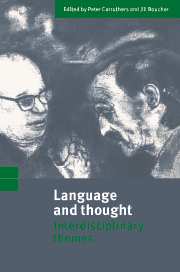Book contents
- Frontmatter
- Contents
- List of contributors
- Preface
- 1 Introduction: opening up options
- Part I Language, development and evolution
- Part II Language, reasoning and concepts
- Introduction to part II
- 6 Aphasic language, aphasic thought: an investigation of propositional thinking in an a-propositional aphasic
- 7 Representing representations
- 8 Magic words: how language augments human computation
- 9 The mapping between the mental and the public lexicon
- 10 Convention-based semantics and the development of language
- Part III Language and conscious reasoning
- References
- Author index
- Subject index
8 - Magic words: how language augments human computation
Published online by Cambridge University Press: 08 January 2010
- Frontmatter
- Contents
- List of contributors
- Preface
- 1 Introduction: opening up options
- Part I Language, development and evolution
- Part II Language, reasoning and concepts
- Introduction to part II
- 6 Aphasic language, aphasic thought: an investigation of propositional thinking in an a-propositional aphasic
- 7 Representing representations
- 8 Magic words: how language augments human computation
- 9 The mapping between the mental and the public lexicon
- 10 Convention-based semantics and the development of language
- Part III Language and conscious reasoning
- References
- Author index
- Subject index
Summary
Word power
Of course, words aren't magic. Neither are sextants, compasses, maps, slide rules and all the other paraphernalia which have accreted around the basic biological brains of Homo sapiens. In the case of these other tools and props, however, it is transparently clear that they function so as either to carry out or to facilitate computational operations important to various human projects. The slide rule transforms complex mathematical problems (ones that would baffle or tax the unaided subject) into simple tasks of perceptual recognition. The map provides geographical information in a format well suited to aid complex planning and strategic military operations. The compass gathers and displays a kind of information that (most) unaided human subjects do not seem to command. These various tools and props thus act to generate information, or to store it, or to transform it, or some combination of the three. In so doing, they impact on our individual and collective problem-solving capacities in much the same dramatic ways as various software packages impact the performance of a simple PC.
Public language, I shall argue, is just such a tool – it is a species of external artefact whose current adaptive value is partially constituted by its role in re-shaping the kinds of computational space that our biological brains must negotiate in order to solve certain types of problems, or to carry out certain complex projects. This computational role of language has been somewhat neglected (not un-noticed, but not rigorously pursued either) in recent cognitive science, due perhaps to a (quite proper) fascination with and concentration upon, that other obvious dimension: the role of language as an instrument of interpersonal communication.
- Type
- Chapter
- Information
- Language and ThoughtInterdisciplinary Themes, pp. 162 - 183Publisher: Cambridge University PressPrint publication year: 1998
- 119
- Cited by



